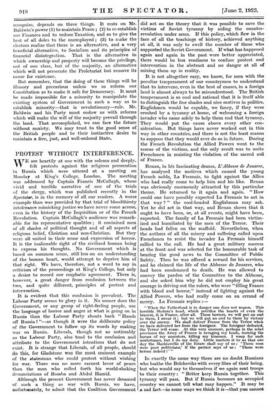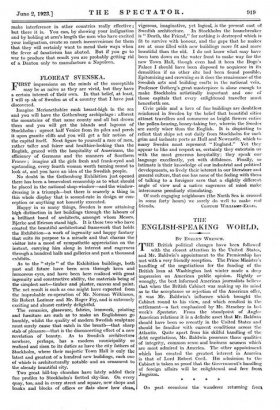PROTEST WITHOUT INTERFERENCE.
NATE are heartily at one with the solemn and deeply. felt protests against the religious persecution in Russia which were uttered at a meeting on Monday at King's College, London. The meeting was addressed by Captain Francis McCullagh, whose vivid and terrible narrative of one of the trials of the clergy, which was published recently in the Spectator, is in the memory of all our readers. A worse example than was provided by that trial of bloodthirsty intolerance mimicking justice we have never come across, even in the history of the Inquisition or of the French Revolution. Captain McCullagh's audience was remark- able for its representative qualities ; it contained men of all shades of political thought and of all aspects of religious belief, Christian and non-Christian. But they were all united in their sense and expression of horror. It is the inalienable right of the civilized human being to express his thoughts. No Government which is based on common sense, still less on an understanding of the human heart, would attempt to deprive him of that right. We have, therefore, not a word to say in criticism of the proceedings at King's College, but only a desire to record our emphatic agreement. There is, however, a great danger from confusion between the two, and quite different, principles of protest and intervention.
It is evident that this confusion is prevalent. The Labour Party seems to glory in it. No sooner does the Government, or any group of right-feeling people, use the language of horror and anger at what is going on in Russia than the Labour Party shouts back " Hands off Russia 1 "—as though it were the deliberate policy of the Government to follow up its words by making war on Russia. Liberals, though not so noticeably as the Labour Party, also tend to the confusion and attribute to the Government intentions that do not exist. It is strange that Liberals, of all people, should do this, for Gladstone was the most eminent example of the statesman who could protest without wishing for war. There was no more earnest lover of peace than the man who rolled forth his world-shaking denunciations of Bomba and Abdul Hamid.
Although the present Government has never dreamed of such a thing as war with Russia, we have, unfortunately, to admit that the Coalition Government did act on the theory that it was possible to save the victims of Soviet tyranny by aiding the counter- revolution under arms. If this policy, which flew in the face. of all the teachings of history, achieved anything at all, it was only to swell the number of those who supported the Soviet Government. If what has happened again and again in the past were better appreciated, there would be less readiness to confuse protest and intervention in the abstract and no danger at all of mixing them up in reality.
It is not altogether easy, we know, for men with the peculiar temperament of our countrymen to understand that to intervene, even in the best of causes, in a foreign land is almost always to be misunderstood. The British temperament is so cool and rational that it is itself able to distinguish the fine shades and nice motives in politics. Englishmen would be capable, we fancy, if they were crushed by a tyranny at home, of welcoming a foreign invader who came solely to help them end that tyranny. They would put the • cause above every other con- sideration. But things have never worked out in this way in other countries, and there is not the least reason to suppose that they would ever do so in future. During the French Revolution the Allied Powers went to the rescue of the victims, and the only result was to unite Frenchmen in resisting the violation of the sacred soil of France.
Renan, in his fascinating drama, L'Abbesse de Jouarre, has analysed the motives which caused the young French noble, La Fresnais, to fight against the Allies who had really come to help him and his like. Renan was obviously enormously attracted by this particular theme. He returned to it again and again. " How could one have possibly expected La Fresnais to act in that way ? " the cool-headed Englishman may ask. Yet he did act in that way, and Renan shows that it ought to have been, or, at all events, might have been, expected. The family of La Fresnais had been victim- ized and humiliated by the men of the Terror. Their heads had fallen on the scaffold. Nevertheless, when the authors of all the misery and suffering called upon Frenchmen to resist the invader La Fresnais himself rallied to the call. He had a great military success at the front and was selected for the honourable task of bearing the good news to the Committee of Public Safety. Then he was offered a reward for his services, and he claimed the life of the Abbesse de Jouarre, who had been condemned to death. He was allowed to convey the pardon of the Committee to the Abbesse, and she asked him why he did not employ his great courage in driving out the rulers, who were "filling France with blood and horror," instead of fighting against the Allied Powers, who had really come on an errand of mercy. La Fresnais replies :- " When the Fatherland is in danger one does not reason. This horrible Medusa's head, which petrifies the hearts of even the bravest, it is France, after all. These horrors, we will put an end to them, I swear it ; but we will pRt an end to them by victory over the enemy. We shall deliver France from the Terror when we have delivered her from the foreigner. The foreigner defeated, the Terror will cease. At this very moment, perhaps in the rebel provinces the Army of France is ravaging my lands, burning the homes of my ancestors, killing my kinsmen. I weep for such misfortunes, but I do my duty. Little matters it to us that one day the Machiavellis of the future shall say of us : Those men were poor politicians,' if the patriot says of us : Those were heroes indeed 1' " In exactly the same way there are no doubt Russians who loathe the Bolsheviks with every fibre of their being, but who would say to themselves if we again sent troops to their country : " Better keep Russia together. This tyranny will pass. But if Russia becomes an occupied country we cannot tell what may happen." It may be a sad fact—in some ways we_think it is--ithat you cannot make interference in other countries really effective ; but there it is. You can, by showing your indignation and by holding at arm's length the men who have excited your indignation, create so much inconvenience for them that they will certainly want to mend their ways when the fever of fanaticism has abated. But if you go to war to produce that result you are probably getting rid of a Danton only to manufacture a Napoleon.











































 Previous page
Previous page